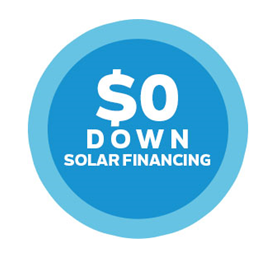The Pros and Cons of PACE Solar Financing
You may have heard both good and bad things about PACE financing. Solar financing can be a good fit for some people, but not everyone. Here’s a deep dive into the advantages and things to be aware of with PACE.
What is PACE financing and where is it available?
Property Assessed Clean Energy (PACE) is a financing option for home energy improvements.
Not everyone who wants to make energy upgrades can afford a big upfront investment. For these people, PACE financing offers a new option. It allows homeowners to install clean energy systems (such as solar) or make other energy efficiency improvements with zero initial costs.
The PACE program is currently available in California, Missouri, and Florida for residential homes. The loan is paid off through an increase in property taxes. Here’s another article with a general overview of PACE.
Positive Aspects of PACE Financing for Homeowners
1. No Upfront Cost

PACE loans don’t require an initial investment, but the benefits start right away. Efficiency improvements can reduce monthly expenses. Clean energy generation, such as a solar panel system, can put a significant dent in energy bills or eliminate them. This is especially important in places like California and Florida, where energy costs are high.
2. Loan Stays with Property
Another positive aspect for homeowners is that they are not technically responsible for the loan should they decide to move. So, even if a homeowner installs energy upgrades and wants to move a year later, the loan stays with the property. Plus, the home is more valuable (thanks to those upgrades) and will likely sell for more money.
3. No Credit Check
This is very different from personal loans, second mortgages, home equity loans or other financing options. These typically require a down payment, or for the loan to be paid in full if the homeowner moves.
PACE loan assessments are based on property equity rather than credit score, employment history, monthly income, and debt. This could be a double-edged sword. It makes these loans easier to acquire, even if you don’t have a credit score in the 800s, but it could also spell trouble for a homeowner who doesn’t have a solid grasp on their finances.
What are some concerns with PACE financing?
1. Additional Property Taxes

While you might be able to ask for more with your home’s improvements, there’s also a chance you could have trouble selling it with additional property taxes attached.
2. Property Lien
Another possible selling roadblock is that a PACE loan is a first lien on the property. This means if a borrower (your potential buyer) can’t make the payments, the PACE lenders must be paid back before the mortgage lenders in the case of foreclosure or default, which is risky for lenders. This means mortgage companies might not lend the money to your potential buyer.
3. Complicated Structure
The major caution for homeowners is if they do not fully understand the details of the loan and can’t afford the increase in property taxes. If this happens and payments are missed, homeowners could be at risk of losing their homes.
There have been instances of contractors not clearly explaining the process and how the loan would be paid back. This lack of clarity is perhaps the most off-putting aspect of PACE financing. In the wrong hands, a PACE loan could be used by dishonest, or at least pushy, salespeople to manipulate homeowners into signing up for something they don’t fully understand and might not be able to afford.
How are PACE issues being solved?
This is not to say that customer experiences have been bad overall. In fact, most homeowners are happy with their PACE loans. DBRS, a credit rating agency, recently released data showing that foreclosure rates for houses with PACE loans are low (1.4 to 1.9 percent) compared to combined tax delinquency rates (1.9 to 2.3 percent).
As the system matures, the process is being improved. Two new laws were passed last year in California to protect homeowners.
The laws ensure that:
- Homeowners are fully aware of the stipulations, terms, and agreements in the loans.
- Loan providers perform due diligence to confirm that homeowners are financially able to repay the loan.
These laws hold PACE lenders to similar standards of transparency to those of traditional mortgage lenders. Hopefully, similar laws will be passed in other PACE states.
Pros and Cons of PACE Solar and Energy Financing
In summary, here are the main pros and cons of PACE:
Pros:
- No upfront cost – the loan is repaid over 10 to 30 years through the property tax bill
- Potentially reduces monthly utility expenses
- Possibly eligible for energy tax credits and rebates
- Loan passes onto next homeowner
- House could sell for more money with improvements
- No credit check
Cons:
- The increased property tax bill
- Often a higher interest rate than other energy efficiency mortgage alternatives
- Lack of understanding or ability to pay an increase in property taxes could result in foreclosure
- Many major mortgage lenders do not allow PACE financing
- Possible difficulty in selling
In conclusion, do your homework!
- Make sure you understand the details of what you’re signing up for
- Shop around and get several quotes from different contractors and loan providers
- Know the interest rate of the loan, project costs, fees, and payment terms
- Be sure that you have the income to cover the increase in property taxes
- Know yourself! Do you have the discipline to make the payments on time?
If you’re confident that you’ve found the best rate and understand your PACE loan, you could benefit. When in doubt, talk to your financial advisor or tax professional to get their insight into your unique situation.





